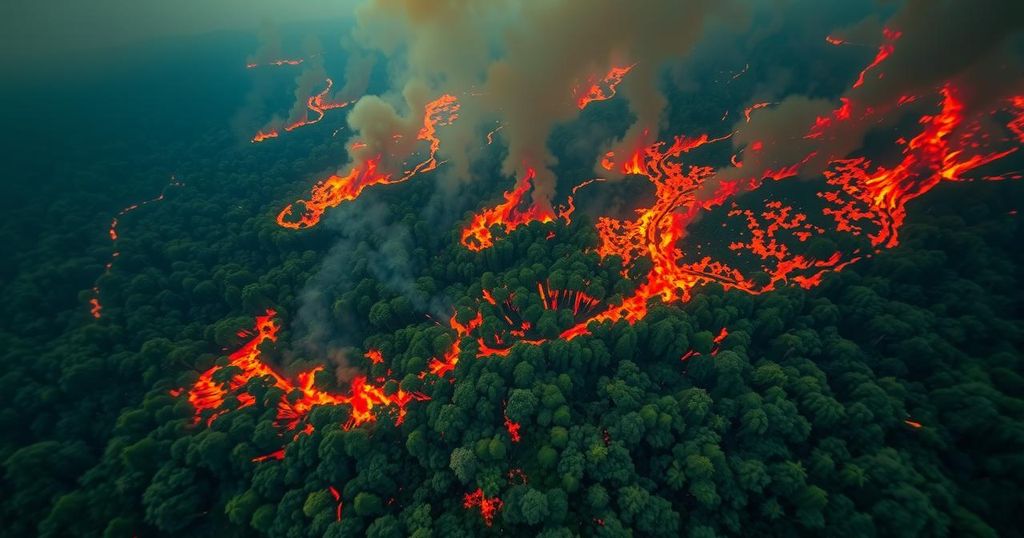Wildfires in Brazil’s Amazon have surged to alarming levels in 2024, largely due to severe drought and potential criminal exploitation of climate change. The area destroyed by fire has increased by 846% compared to last year, raising significant concerns among experts and officials about the motivations behind these disasters amid a backdrop of environmental change.
Recent devastating wildfires in Brazil’s Amazon rainforest have consumed an area equivalent to that of Switzerland, leading to concerns that criminals are exploiting climate change conditions to increase deforestation and fire usage. A satellite assessment highlighted that from January to mid-October 2024, wildfire occurrences surged by an alarming 846% compared to the same period in 2023, far surpassing the destruction witnessed during the presidency of Jair Bolsonaro in 2019. The National Institute for Space Research (INPE) has observed that the unprecedented increase in forest fires corresponds with ongoing severe drought conditions exacerbated by climate change. The director of science at the Amazon Environmental Research Institute, Ane Alencar, emphasized the alarming nature of this sudden spike, suggesting that while drought conditions have intensified fire spread, human actions have also played a crucial role. Notably, recent fires have started with minimal effort from criminals who bypass traditional logging processes, igniting blazes using just gasoline. This phenomenon has drawn the attention of Brazilian officials, as they suspect that illegal activities may be taking advantage of the environmental changes for profit. André Lima, secretary of deforestation control, reported that the fires, which have led to significant forest loss, could be instigated even by a small group of individuals. Areas such as Jamanxim National Forest, targeted for illegal ranching activities, have suffered enormously, with fire affecting approximately 1,900 square kilometers this year alone, a staggering 700% increase from the previous year. As the international community gears up for COP30, scheduled in Belém, Brazil next year, the Brazilian government is contemplating mandatory reforestation for all burned land to inhibit illegal land grabs. Amidst this crisis, the government is encouraged to undertake more robust policy changes that address climate change effectively, as it is clear that the rise in wildfires is part of a troubling global trend that not only devastates the forest but also exacerbates climate change through increased carbon emissions.
The Amazon rainforest has been under severe pressure from both natural drought and human activities for several years. In particular, deforestation combined with climate change has accelerated wildfires, which have devastating impacts on biodiversity, climate regulation, and local communities. Recent patterns show a disturbing increase in the area affected by wildfires, raising questions about the motivations behind these acts as potential criminal activities emerge as a significant factor amid changing environmental conditions. This situation calls for a deeper understanding of the interactions between climate change, illegal land use practices, and wildfire dynamics.
The Amazon rainforest’s current crisis stemming from unprecedented wildfire levels highlights both environmental and human factors at play. Criminal exploitation of climate change, coupled with severe drought conditions, poses significant threats to the integrity of one of the world’s most vital ecosystems. As discussions progress towards international climate commitments, it is imperative for Brazilian authorities to enhance environmental protection measures and engage in comprehensive policy reforms that can mitigate both the threats posed by climate change and illegal land exploitation while ensuring forest recovery.
Original Source: apnews.com






